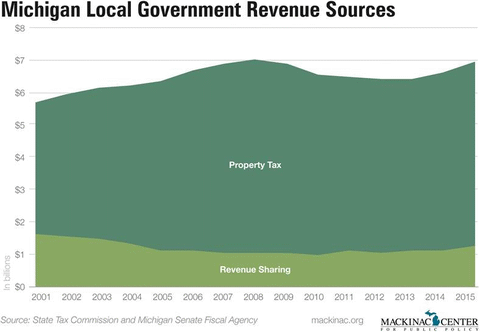Commentary
Michigan Local Government Revenues Strong Despite Complaints
Taxpayers already provide local governments more money
As Wayne County exits its direct state oversight, some are continuing the call for more money to local governments. Yet Michigan’s taxpayers already are providing local governments with more revenue.
Cities, villages, townships and counties have two major sources of operating revenues: property taxes and sales taxes. No local government levies a sales tax, but the state shares a portion of its sales tax revenue with local governments, with a portion mandated by the constitution and a portion that lawmakers determine annually.
Property taxes are a larger source of tax dollars for local governments than the sales tax revenue sharing, but both are important and experienced different trends over the past 15 years.

From 2001 to 2008, combined revenue sharing and local government property tax revenue increased by $1.2 billion, a 21.4 percent gain. Property taxes increased by $1.7 billion but revenue sharing dropped by $479 million.
The recession took its toll on property values in Michigan, so there were fewer dollars generated by property taxes. This decreased revenues by $579 million, an 8.3 percent decline from 2008 to 2012. Revenue sharing declined only $29 million.
Both property tax revenue and revenue sharing have recovered since then, with overall revenue increasing by $553 million from 2012 to 2015. Total property tax revenue is up $381 million and revenue sharing is up $171 million.
There isn’t a report out yet on property tax revenues in 2016, though the state’s revenue estimators predict growth. The state already approved the fiscal year 2017 budget, which includes a small increase in shared revenue.
While these are the overall state trends, each government unit is going to vary.
It is tough to say the revenue system is broken when revenues are up, and especially when the state still hasn’t fully recovered to its 2000 job levels. Better to look on the spending side of local finances.
|

Michigan Local Government Revenues Strong Despite Complaints
Taxpayers already provide local governments more money
As Wayne County exits its direct state oversight, some are continuing the call for more money to local governments. Yet Michigan’s taxpayers already are providing local governments with more revenue.
Cities, villages, townships and counties have two major sources of operating revenues: property taxes and sales taxes. No local government levies a sales tax, but the state shares a portion of its sales tax revenue with local governments, with a portion mandated by the constitution and a portion that lawmakers determine annually.
Property taxes are a larger source of tax dollars for local governments than the sales tax revenue sharing, but both are important and experienced different trends over the past 15 years.
From 2001 to 2008, combined revenue sharing and local government property tax revenue increased by $1.2 billion, a 21.4 percent gain. Property taxes increased by $1.7 billion but revenue sharing dropped by $479 million.
The recession took its toll on property values in Michigan, so there were fewer dollars generated by property taxes. This decreased revenues by $579 million, an 8.3 percent decline from 2008 to 2012. Revenue sharing declined only $29 million.
Both property tax revenue and revenue sharing have recovered since then, with overall revenue increasing by $553 million from 2012 to 2015. Total property tax revenue is up $381 million and revenue sharing is up $171 million.
There isn’t a report out yet on property tax revenues in 2016, though the state’s revenue estimators predict growth. The state already approved the fiscal year 2017 budget, which includes a small increase in shared revenue.
While these are the overall state trends, each government unit is going to vary.
It is tough to say the revenue system is broken when revenues are up, and especially when the state still hasn’t fully recovered to its 2000 job levels. Better to look on the spending side of local finances.
Michigan Capitol Confidential is the news source produced by the Mackinac Center for Public Policy. Michigan Capitol Confidential reports with a free-market news perspective.